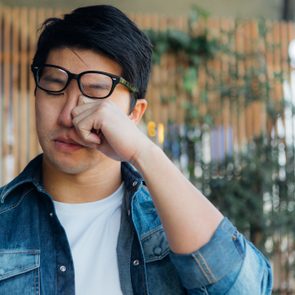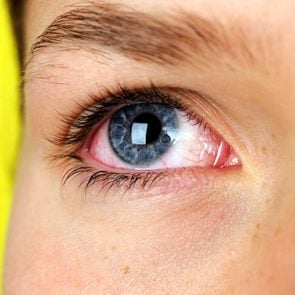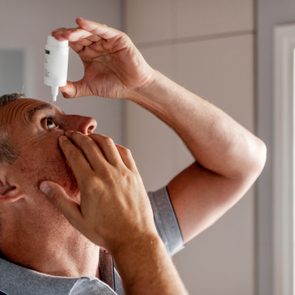Have Dry Eyes at Night or When You Wake Up? Here’s Why
Updated: Jun. 16, 2021
Your dry eye syndrome may be worse in the mornings or in the evenings, depending on the cause. Regardless of when your eyes are at their driest, there are ways to reduce the symptoms.
Dry eye 101
Dry eyes at night or in the morning can drive you to distraction. Instead focusing on your computer, a book, or the person you’re talking to, you might end up squinting through blurry vision or rubbing itchy eyes.
Those are common reactions to a very common condition. Nearly 5 million Americans ages 50 and older experience dry eye symptoms, with tens of millions more living with less-severe symptoms, according to the National Eye Institute.
Pretty much anyone can develop dry eyes, but the condition is more common if you’re female, older than 50, wear contact lenses, or have certain underlying autoimmune conditions, like lupus or Sjögren’s syndrome, which can cause your body to misfire against the glands that make tears and saliva.
Other causes of dry eye are computer use, taking certain medications, and laser eye surgery.
If you’ve been dealing with dry eyes at night or in the morning, here’s what to know about the condition—and how to treat it.
Signs you have dry eyes
Blinking sends tears over your eyes to keep the surface smooth and clear and to wash away any debris. If you have dry eye syndrome, your eyes either don’t make enough tears or the quality of tears isn’t very good.
This leads to some uncomfortable dry eye symptoms including:
- Stinging
- Eye fatigue
- Redness
- Sensitivity to light
- Blurry vision
- Watery eyes during the day, in the evening, or around the clock
Dry eye symptoms can be intermittent or chronic.
“Different people have different symptoms, and morning eye dryness or evening dryness can be part of the constellation of features,” says Kathryn A. Colby, MD, PhD, chair of ophthalmology at NYU Grossman School of Medicine in New York City.
Types of dry eye
There are several types of dry eye, Dr. Colby says. The two most common types are aqueous tear deficiency and evaporative dry eye disease.
“Either you don’t make enough tears (aqueous tear deficiency), or the tears you make evaporate too quickly (evaporative dry eye disease),” she explains.
Tear film comprises three layers, including an oily layer on the outside, a watery layer in the middle, and an inner mucus layer.
Evaporative dry eye disease occurs if your tears are deficient in their oily layer. The meibomian glands in your eyelinds secrete oil to coat the surface of your eyes and keep the water part of your tears from drying out. When those glands aren’t working properly, there’s not enough oil to stop your tears from evaporating.
(Here’s one woman’s journey to find relief while living with meibomian gland dysfunction.)
Why do you have dry eyes at night?
If you have evaporative dry eye disease, your eyes are likely worse in the evening, says Angela Bevels, an optometrist who runs Elite Dry Eye Spa in Tucson, Arizona.
“This is because you may have issues with the environment, such as lack of humidity,” she says. “And we stare at computers and phones all day, which causes a decrease in blinking.”
Remember, blinking is how tears spread over the eye. Reduce the number of times you blink, and you’re lessening the amount of tears on your eye.
“These individuals often complain that their dry eye gets worse as the day progresses,” she says.
Wearing contact lenses for too long during the day can also lead to worse dry eye symptoms at night, Bevels says. As can dehydration from not drinking enough water during the day.
“Good hydration is really important for producing good-quality tears,” she says. The American Optometric Association suggests aiming for eight to 10 glasses of water every day.

Why do you have dry eyes in the morning?
Waking up with dry eyes may indicate you sleep with your eyes open, a condition known as nocturnal lagophthalmos, Dr. Colby says. The only way to know that you sleep with your eyes open is usually if a bed partner tells you, but even a small opening can dry out your eyes.
You may also have been born with eyelids that don’t close, or your eyelid muscles may be damaged by infection, inflammation, injury, or underlying disease, according to the American Academy of Ophthalmology.
Treatments are available to relieve the symptoms and also address the cause. They include taping the eyelids shut with medically safe tape, using eye-wetting drops or ointments at night, and surgery. (More on treating dry eye below.)
Dry eye during the day may also be a result of something in your bedroom environment. Do you sleep with a fan nearby or the air conditioning on full blast? These can leave your eyes dry and irritated, says Dr. Colby. Sleeping with a humidifier can help keep the air moist and your eyes lubricated, she says.
Treating dry eyes
“There is not one dry eye [treatment],” Dr. Colby says. “The treatment has to be personalized for the symptoms and when you are having the symptoms.”
Keeping a journal that includes dry-eye symptoms, any aggravating factors, as well as the time of day or night that your symptoms are most bothersome can help your eye doctor determine what kind of dry eye you have and recommend treatments, she says.
Typically, treatments for dry eyes focus on either adding more tears or saving the ones you have. Here are some common options.
Try artificial tears
Artificial tears are a mainstay of dry eye treatments, according to Dr. Colby.
“Choose preservative-free tears if you use them more than four times a day, as the preservatives can further aggravate your dry eyes,” she says.
Many of the best eye drops for dry eyes are available without a prescription. That said, your doctor may suggest prescription eye drops such as cyclosporine (Restasis) or lifitegrast (Xiidra).
For nighttime dry eyes, thick gels and ointments may provide more relief than drops.
Plug your tear ducts
Plugging or blocking tear ducts is one way to save your tears. This procedure keeps tears in your eyes longer and stops them from draining through the nose. If you have this procedure, a doctor will insert tiny punctal plugs into your tear ducts.
Make medication changes
Relieving dry eyes at night or in the morning may be as simple as tweaking your current medication regimen, Dr. Colby says.
Many medications cause or contribute to dry eye, including the allergy pills you take to stave off seasonal sniffling and sneezing.
Other medications that can cause dry eyes are blood pressure-lowering drugs, such as diuretics and beta-blockers, sleeping pills, antianxiety and/or antidepressant medicines, and heartburn remedies, according to the American Academy of Ophthalmology.
Your doctor may be able to recommend alternative medications if dry eye syndrome is bothersome, Dr. Colby says.
Decrease screen time
Staring at a screen for a while without blinking could decrease tear production. And daily screen time use is up due to the Covid-19 pandemic. But taking frequent blink breaks makes a difference, Dr. Colby says.
“When we are concentrating, we don’t blink, and you need to blink to spread tears across your cornea,” she says.
Dr. Colby recommends the 20-20-20 rule: “Every 20 minutes, take a 20-second break and look at least 20 feet away.” This exercise encourages blinking.
Other changes
Lifestyle changes can also help keep your eyes lubricated during the day and night, Dr. Colby adds. For starters, she says, “stay hydrated and don’t have dehumidified air blowing your face.”
Other home remedies for dry eye and tips for dry eye prevention include using a humidifier and wearing glasses in windy weather.
Using surgical tape to keep your eyes closed while you sleep may prevent dry eye symptoms. Be sure to follow your doctor’s instructions and wash your hands before you apply the tape.
When to talk to your doctor
Your primary care doctor may be able to diagnose you with dry eye syndrome based on your symptoms, but in some cases, a specialist or eye doctor is necessary. Any discomfort from dry eye during the night or day that impacts your quality of life is worth discussing with your physician.
Letting your eye doctor know when your symptoms are worse can help the doctor figure out what drives your dry eye and better pair treatments to the precise cause.
Untreated chronic dry eye may lead to complications and risks, such as a corneal ulcer, conjunctivitis, and trouble with reading or driving.
However, over-the-counter artificial tears, surgery, medication changes, and even lifestyle changes could make a difference in resolving dry eyes. So reach out to your doctor at the first sign of a problem.


















